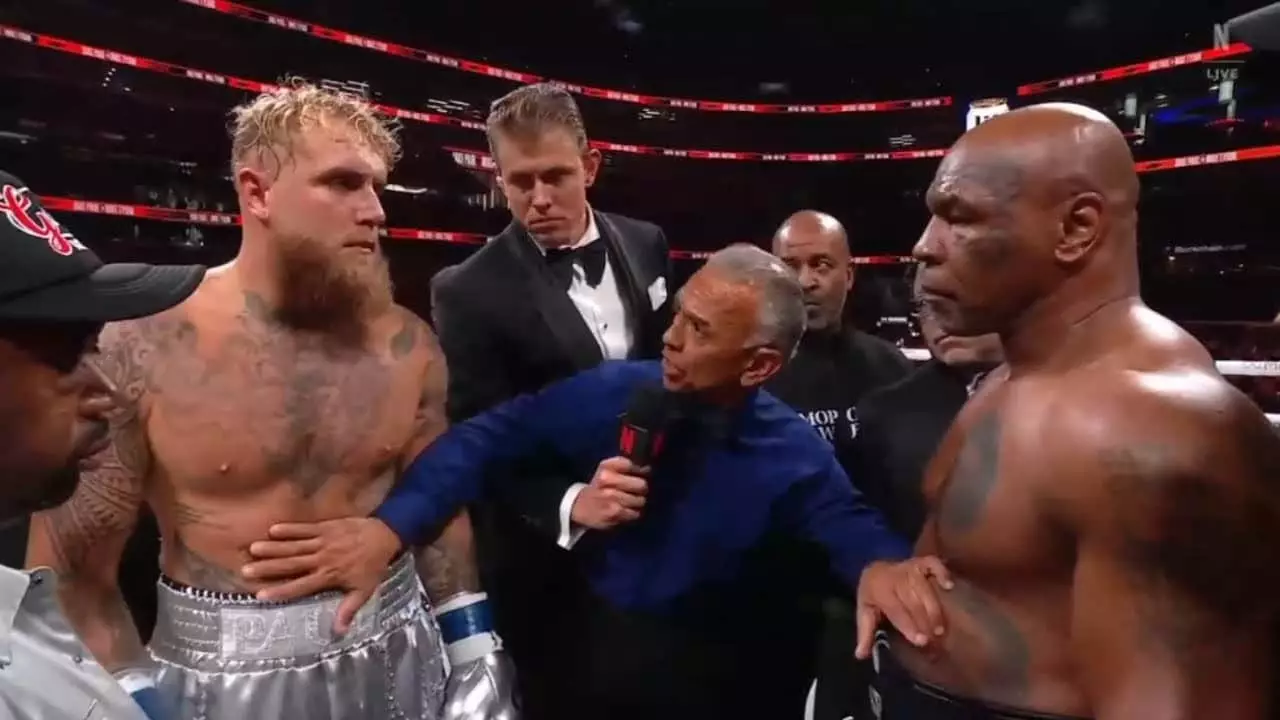In recent years, the rise of influencer-led boxing has generated both excitement and skepticism among fans of the sport. The allure of seeing social media stars enter the ring has captivated audiences, but concerns about the quality of competition have grown. This trend was starkly illustrated in the recent bout between Jake Paul and 58-year-old Mike Tyson, a fight that left many spectators feeling short-changed. The anticipation for an exhilarating match gave way to disappointment as Paul’s fighting style came under heavy scrutiny, paving the way for a broader conversation about the future of boxing and the implications of celebrity involvement.
During the fight, Jake Paul’s approach sparked intense criticism from boxing commentators and fans alike. His non-committal stance and excessive retreat—described as leaping “40 feet” back after throwing punches—became emblematic of his strategy. Former champion Paulie Malignaggi did not hold back in his condemnation, calling Paul “scared” and pointing out that his lack of aggression reduced what could have been an exciting spectacle into a mundane affair that failed to engage viewers. For many observers, the expectation was that a young fighter like Paul would have taken the opportunity to test himself against a legendary but aging opponent. Instead, his performance illustrated a troubling passivity that raised questions about his status as a legitimate fighter.
While Jake Paul ultimately secured a unanimous decision victory, the means by which he achieved it were marred by the dubious quality of the spectacle. Boxing fans yearn for competitive integrity, and Paul’s lack of willingness to engage, especially against a slower, older opponent like Tyson, left a bitter aftertaste. Malignaggi’s pointing out that had Paul shown more courage—and, in turn, a willingness to risk defeat—the fight could have generated greater interest raises crucial considerations about how fighters cultivate their legacies in modern boxing.
The consensus among fans who tuned in to watch the match was one of disappointment. Many felt that they had been shortchanged by a lack of entertainment that was promised in the lead-up to the fight. The bout, rather than providing the expected drama and excitement, felt more like a timid sparring session than a competitive boxing match. Viewers were left lamenting a hollow victory that lacked the thrills that come with genuine boxing entertainment.
A key point of frustration stemmed from the nature of celebrity boxing, where the line between entertainment and competition blurs. While fighters should often prioritize winning, there is an unspoken contract with fans: to entertain and provide a memorable spectacle. Paul’s strategy led to accusations of him being a “cherry-picker,” a fighter focused on selective matchups that protect his standing rather than risk it in higher-stakes situations. Critics argue that this picks a path ill-suited for true boxing enthusiasts, ultimately degrading the sport’s traditional values.
As Jake Paul continues his journey in boxing, the critical reaction to his fight against Mike Tyson raises important debates about the future of the sport. Influencer-led boxing events often draw in vast audiences due to the crossover appeal of their stars, but if the quality of these matches does not improve, the sustainability of such events becomes questionable. Fans craving a return to high-caliber boxing are increasingly vocal about their desires for real competition, not merely promotional exhibitions lacking substance.
Moreover, celebrity fighters like Paul must confront an essential reality: if they are to be taken seriously, they will need to make more significant sacrifices in pursuit of authenticity in their sport. Public perception plays a pivotal role in any athlete’s career trajectory, and the current trajectory of celebrity boxing could find itself in peril if fighters keep opting for safety over spectacle.
The lack of engagement demonstrated by Jake Paul against Mike Tyson in their recent bout exposes a troubling trend within the realm of celebrity boxing, one that might ultimately disappoint long-time fans of the sport. If boxing is to continue attracting new audiences through influencer participation, those involved must reconceptualize what it means to compete in the ring. The expectations from fans are clear: they seek genuine competition marked not only by victories but also by a willingness to embrace the risks of defeat. Only then can the sport reclaim its dignity and continue to thrive in a world increasingly dominated by entertainment-driven narratives.

